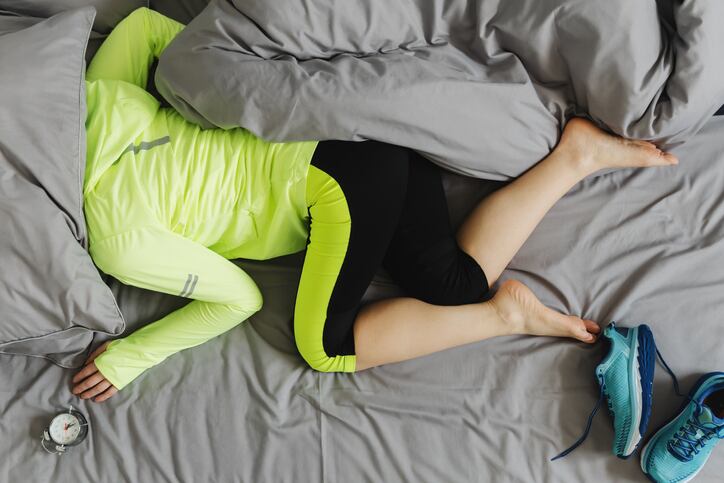Academic sleep associations recommend exercise as a low-cost, easily administered, and non-pharmacologic intervention for improving sleep—but individuals may not perceive a difference.
A number of epidemiologic studies have found that not getting enough sleep or poor sleep quality is associated with multiple adverse effects on both mental and physical health. Mounting evidence also indicates that it can disrupt the immune system, making it easier for one to get sick.
Background
During sleep, the immune system releases proteins called cytokines, some of which help promote sleep. Certain cytokines need to increase when you have an infection or inflammation, or when you're under stress. Sleep deprivation may decrease production of these protective cytokines, which can throw off the immune system and lead to illness.
To avoid this, exercise is often recommended to promote sleep quality by decreasing sleep onset latency and wake after sleep. Exercise also increases sleep efficiency and slow-wave sleep (SWS), or deep sleep. Some studies also report that repeated exercise can induce more salient, chronic effects on the sleep architecture.
Sleep architecture refers to the structure of sleep cycles throughout the night and the five stages of sleep including four stages of non-rapid eye movement (NREM) sleep and the fifth stage, rapid eye movement (REM) sleep.
However, studies investigating the link between exercise and sleep have produced a range of conflicting results, which could have been due to limitations related to systems of classifying sleep stages.
Getting to the bottom of sleep
To address these contradictory results, researchers from the University of Tsukuba in Japan enlisted the coefficient of variation of the envelope (CVE), a new computational tool for analyzing brain signals like those collected in sleep research.
"CVE is a novel tool for quantifying sleep depth according to the characteristics of brain oscillations," explained senior study author Professor Kaspar E. Vogt. "We wanted to use it to determine whether exercise would improve or decrease sleep quality, in addition to determining whether short bouts of exercise could exert a lasting effect on metabolic state."
The study
In a group of healthy young men researchers examined the effects of 60 minutes of vigorous exercise on sleep quality. Sleep quality was determined both subjectively and by using polysomnography, a method that records brain waves, the oxygen level in blood, heart rate and breathing, as well as eye and leg movements. The researchers then then used the CVE approach to assess the stability of SWS.
Surprising results
The results took the researchers by surprise. "We found that exercise improved the quality of sleep as measured using objective techniques, while the participants reported no change in the quality of their sleep,” explained lead researchers Insung Park and Javier Díaz.
The researchers speculated that the benefits of enhanced sleep quality might have been countered by an increase in stress and muscle soreness, because the participants were not accustomed to vigorous exercise.
The report noted that post-exercise sleep was judged subjectively worse compared to sleep following non-exercise conditions.
“We hypothesize that mechanisms underlying the post-exercise oxygen deficit and excess oxygen consumption indicate that subjects are under stress and this might explain this lower subjective assessment regarding the 'Refreshness' category in the exercise condition. Another potential reason for subjectively worse sleep after vigorous exercise is muscle soreness as the participants were not accustomed to vigorous exercise,” the study noted.
"The results of the subjective evaluations of sleep quality indicate that regular moderate exercise may be more beneficial for perceived sleep quality than occasional vigorous exercise, which might not have a subjective effect despite objective improvements in sleep," said Vogt.
According to the report, exercise is ideal as a non-pharmacologic way to improve subjective sleep quality—even if individuals don’t ‘feel’ the benefits.
Immunity and Sleep Webinar
Sleep and a healthy immune system go hand-in-hand. To learn more about ways to improve sleep and, as a result, support the immune systems, join us on May 5 at 11amCT for Immunity and Sleep. Click here to learn more about this free event.
Source: Scientific Reports
11, 4410 (2021) doi.org/10.1038/s41598-021-83817-6
“Exercise improves the quality of slow-wave sleep by increasing slow-wave stability”
Authors: I. Park et al.

